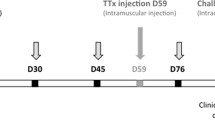Abstract
MR16-1 is a monoclonal antibody to mouse IL-6 receptor (IL-6R) and a good tool to investigate the involvement of IL-6 in mouse disease models. However, long-term administration of MR16-1 induced anti-MR16-1 antibody that inhibited IL-6 blocking activity of MR16-1. In this study, we treated NZB/NZW F1 (BWF1) mice with MR16-1 (0.5 mg, weekly) and tested for proteinuria (an indicator of autoimmune disease) after inducing tolerance by intraperitoneal injection of anti-CD4 mAb, or in an exploratory experiment, by prior intravenous injection of 2 mg MR16-1. Anti-CD4 mAb treatment inhibited anti-MR16-1 antibody production. And the appearance of proteinuria was significantly delayed. However, anti-CD4 mAb injection alone also significantly delayed the onset of nephritis compared with saline treatment. Intravenous MR16-1 (2 mg) followed by weekly MR16-1 injections inhibited the production of anti-MR16-1 antibody and consequently decreased the prevalence of proteinuria and the level of anti-DNA antibodies. These results established the viability of intravenous MR16-1 injection as a means of inducing tolerance. It is superior to the anti-CD4 mAb method because it enabled the effects of MR16-1 monotherapy to be evaluated without the confounding effects of anti-CD4 mAb.



Similar content being viewed by others
References
Finck BK, Chan B, Wofsy D (1994) Interleukin 6 promotes murine lupus in NZB/NZW F1 mice. J Clin Invest 94:585–591
Mihara M, Takagi N, Takeda Y, Ohsugi Y (1993) IL-6 receptor blockage inhibits the onset of autoimmune kidney disease in NZB/W F1 mice. Clin Exp Immunol 112:397–402
Wofsy D (1993) Treatment of murine lupus with anti-CD4 monoclonal antibodies. Immunol Ser 59:221–236
Weigle WO (1973) Immunological unresponsiveness. Adv Immunol 16:61–122
Liblau RS, Tisch R, Shokat K, Yang X, Dumont N, Goodnow CC, McDevitt HO (1996) Intravenous injection of soluble antigen induces thymic and peripheral T-cells apoptosis. Proc Natl Acad Sci USA 93:3031–3036
Okazaki M, Yamada Y, Nishimoto N, Yoshizaki K, Mihara M (2002) Characterization of anti-mouse interleukin-6 receptor antibody. Immunol Lett 84:231–240
Muraguchi A, Hirano T, Tang B, Matsuda T, Horii Y, Nakajima K, Kishimoto T (1988) The essential role of B cell stimulatory factor 2 (BSF-2/IL-6) for the terminal differentiation of B cells. J Exp Med 167:332–344
Mihara M, Nishimoto N, Yoshizaki K, Suzuki T (2002) Influences of anti-mouse interleukin-6 receptor antibody on immune responses in mice. Immunol Lett 84:223–229
Tsubata T, Wu J, Honjo T (1993) B-cell apoptosis induced by antigen receptor crosslinking is blocked by a T-cell signal through CD40. Nature 364:645–648
Haneda K, Sano K, Tamura G, Shirota H, Ohkawara Y, Sato T, Habu S, Shirato K (1999) Transforming growth factor-beta secreted from CD4+T cells ameliorates antigen-induced eosinophilic inflammation. A novel high-dose tolerance in the trachea. Am J Respir Cell Mol Biol 21:268–274
Mihara M, Ohsugi Y, Saito K, Miyai T, Togashi M, Ono S, Murakami S, Dobashi K, Hirayama F, Hamaoka T (1988) Immunologic abnormality in NZB/NZW F1 mice. Thymus-independent occurrence of B cell abnormality and requirement for T cells in the development of autoimmune disease, as evidenced by an analysis of the athymic nude individuals. J Immunol 141:85–90
Author information
Authors and Affiliations
Corresponding author
Rights and permissions
About this article
Cite this article
Yoshida, H., Hashizume, M., Suzuki, M. et al. Induction of high-dose tolerance to the rat anti-mouse IL-6 receptor antibody in NZB/NZW F1 mice. Rheumatol Int 31, 1445–1449 (2011). https://doi.org/10.1007/s00296-010-1500-8
Received:
Accepted:
Published:
Issue Date:
DOI: https://doi.org/10.1007/s00296-010-1500-8




